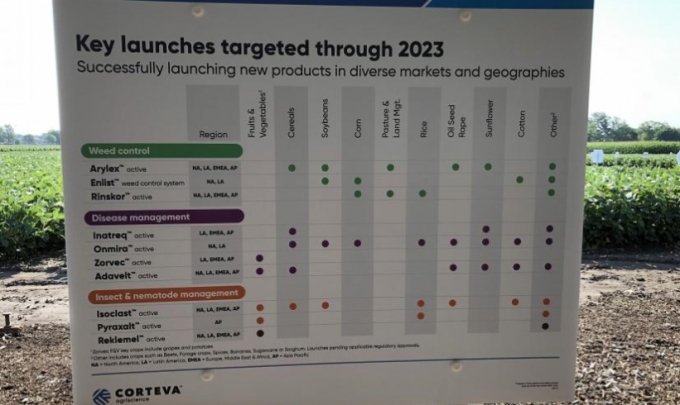June 21, 2025 | 02:56 GMT +7
June 21, 2025 | 02:56 GMT +7
Hotline: 0913.378.918
June 21, 2025 | 02:56 GMT +7
Hotline: 0913.378.918

This is a listing of Corteva's expected product launches through 2023. Photo: The Author
In the corn market, Corteva officials hope to introduce Resicore XL herbicide next season. The premix features three herbicide sites of action groups – acetochlor (Group 15), clopyralid (Group 4) and mesotrione (group 27) – to counter tough weeds and resistance issues.
The herbicide will provide residual control or activity extending up to eight weeks of 75 broadleaf weeds and grasses, according to Brandon Walter, Corteva U.S. product manager, corn herbicides. Target weeds include some of the most difficult to control that farmers face today, including Palmer amaranth, waterhemp, marestail, common ragweed and giant ragweed.
Resicore XL can be applied preplant, preemergence and postemergence – including in corn 11” or larger, giving it the widest application window in the company’s corn herbicide portfolio.
“Farmers increasingly face unpredictable weather conditions, and Resicore XL will give them the flexibility to navigate those conditions,” Walter says. “They’ll also be able to manage application rates, based on what their weed-control needs are at the time.”
Crop safety and tankmix compatibility
In addition, the herbicide contains encapsulated acetochlor, which Walter says enhances its crop safety features. It also offers compatibility of use with glyphosate and atrazine.
“It will give farmers weed control they can trust and next-level application flexibility and crop safety,” he says. “That means clean fields and less crop response opportunities to help farmers maximize yield potential.”
Walter says Corteva is taking advantage of every opportunity it can to look at current modes of action as well as different active ingredients to help farmers stay ahead of what he described as growing weed pressure and weed resistance. The company has launched nine products in the corn herbicide market in the past 20 years.
“We've got a very robust pipeline of new innovation, and not just coming in the corn herbicide portfolio, but also in other portfolios within the crop protection business that we're looking forward to introducing here the next few years to farmers to help meet some of their agronomic needs,” he says.
A good fit for early soybeans, cover crops
For the 2022 season, Corteva officials hope to see EPA grant registration to Lumiderm insecticide seed treatment. The product contains a novel Group 28 insecticide mode of action and provides protection against insects including cutworms, white grubs, thrips and wireworms.
“Lumiderm helps the farmer by increasing seedling vigor in the early growth of that soybean plant – to support the development of a good root system and ensure a healthy, robust plant,” says Brad Van Kooten, Pioneer seed treatment category leader.
Lumiderm also works well when paired with Gaucho seed treatment and other seed-applied products, adding a unique mode of action on bean leaf beetles, seedcorn maggots and aphids, according to Van Kooten.
He says as more farmers push to plant soybeans early to maximize yields, they are looking for tools to protect their investment in seed, crop inputs and time.
“If I’m concerned about my beans getting out of the ground or worried about insects, this is a tool I can use to help alleviate some of those concerns,” he says.
He adds that Lumiderm is also a good fit for farmers who use cover crops.
“Cover crops can be an important part of a sustainable agriculture system by suppressing weeds, preserving nitrogen and improving soil quality, but they also can attract increased and broader insect populations to decaying crop residue and cover crop plants,” Van Kooten says. “Lumiderm reduces the risk of stand loss issues in fields with cover crops with its enhanced protection against heavy insect pressure."
(AgWeb)

(VAN) Poultry production in Poland, which has only started recovering from devastating bird flu outbreaks earlier this year, has been hit by a series of outbreaks of Newcastle disease, with the veterinary situation deteriorating rapidly.

(VAN) Extensive licensing requirements raise concerns about intellectual property theft.

(VAN) As of Friday, a salmonella outbreak linked to a California egg producer had sickened at least 79 people. Of the infected people, 21 hospitalizations were reported, U.S. health officials said.

(VAN) With the war ongoing, many Ukrainian farmers and rural farming families face limited access to their land due to mines and lack the financial resources to purchase needed agricultural inputs.

(VAN) Vikas Rambal has quietly built a $5 billion business empire in manufacturing, property and solar, and catapulted onto the Rich List.

(VAN) Available cropland now at less than five percent, according to latest geospatial assessment from FAO and UNOSAT.

(VAN) Alt Carbon has raised $12 million in a seed round as it plans to scale its carbon dioxide removal work in the South Asian nation.